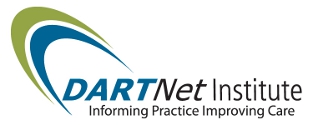Research > CA MRSA
Datasets > CA MRSA
Community-acquired MRSA
A practical intervention that compared a historical cohort to an intervention cohort of patients seen for SSTI (skin and soft tissue infections) in 16 primary care practices in two health care systems. The intervention included a ready-made kit for I&D procedures, MRSA information for clinicians, a patient information handout, provider education, and patient follow-up.
To assess baseline and intervention results, we used DARTNet federated database infrastructure. Patients’ electronic health records were queried for SSTI diagnostic codes by a third party with appropriately executed business associate agreements with the participating health systems. The ICD-9 codes for infections of skin and subcutaneous tissue included 680.x ,681.x, or 682.x Additional data elements necessary for this study were also provided for each case and included procedure data, culture results, prescribed medications, and certain demographic data (nonidentifiable). De-identified data were provided to the research team for analysis. Because the data were abstracted electronically and were de-identified before reaching the research team, no patient consents were required. We also tested a novel “card study” approach using the DARTNet infrastructure. EHR data from participating practices identified patients with SSTI diagnoses. Automated algorithms determined if the provider was sent a link to an evaluation questionnaire (a "card") for a specific case. The link was to a practice-internal web site allowing the provider to view specific patient information and link provider evaluation responses back to the EHR data, all without sharing identifiable data with the research team.
Funding
Agency for Healthcare Research and Quality (AHRQ) Contract #HHSA290200710008, David R. West, PhD (PI), University of Colorado School of Medicine, 09/01/08 – 08/31/10, $152,586
MRSA "I &D toolkits" included the following:
- CDC algorithm/ flowchart
- CDC patient handouts
- All surgical materials needed for I&D and packing of the wound, if desired.
These were usually assembled into transportable trays stored in easily accessible locations.
Publications
Improving the management of skin and soft tissue infections
in primary care: a report from State Networks of Colorado Ambulatory
Practices and Partners (SNOCAP-USA) and the Distributed Ambulatory
Research in Therapeutics Network (DARTNet)
Parnes B, Fernald D, Coombs L, DeAlleaume L, Brandt E, Webster B, Dickinson LM, Pace W, West D.
J Am Board Fam Med. 2011 Sep-Oct;24(5):534-42.
Abstract
| Full Text
An assessment of the Hawthorne Effect in practice-based
research
Fernald DH, Coombs L, DeAlleaume L, West D, Parnes B.
J Am Board Fam Med. 2012 Jan-Feb;25(1):83-6.
Abstract
| Full Text
A toolkit to improve the treatment of CA-MRSA
Stewart EE, Fernald D Staton EW.
Family Practice Management Sept/Oct 2012: 21-22.
Full Text
CDC MRSA Guidelines:
http://www.cdc.gov/mrsa/treatment/outpatient-management.html
Dataset Description
| Type of Patients Included | N | Data Elements |
| All patients with a diagnosis of a SSTI | 3112 |
|

